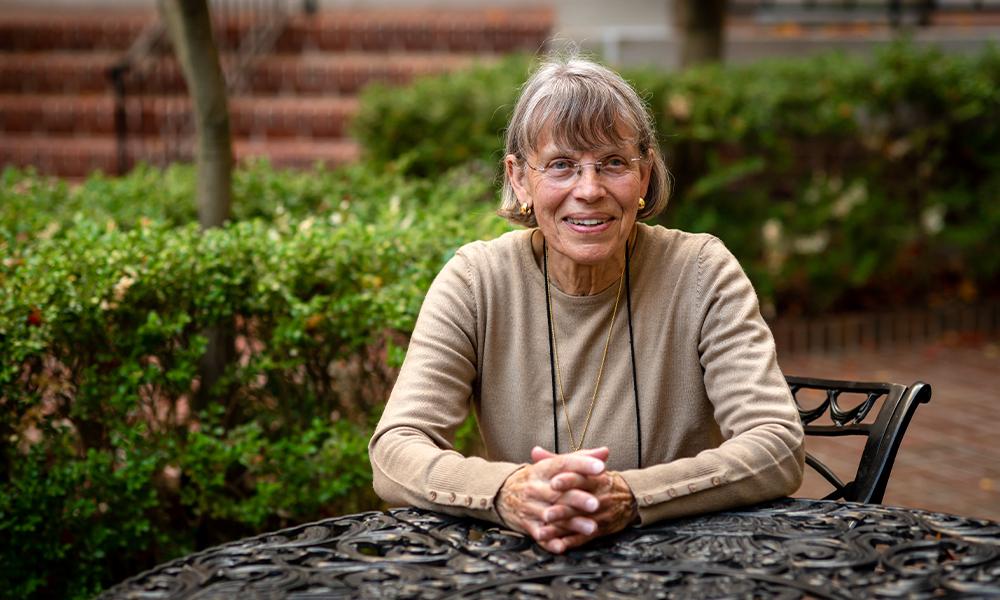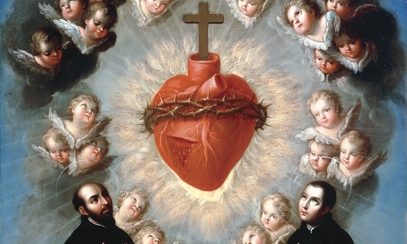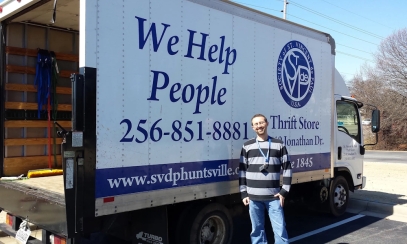
'The Best Job in the Whole, Wide World’
A 37-Year Ministry of Hope and Consolation
A 37-Year Ministry of Hope and Consolation
Into room 325 walks Priscilla Davis, a long-time pastoral minister employed by the Cathedral of St. Paul. In the shared room reside two ladies, both bedridden. Davis greets the first lady and is told the joyous news of the woman’s recent marriage. After a short chat, Davis makes her way to the second lady as the televisions blare in the background. In the second bed lies an elderly Catholic woman, a resident of room 325 for many years. In her windowsill sit several cards from family members. In front of her sits a plate of uneaten food. The woman recognizes Davis immediately. When asked if she wants to receive the Blessed Sacrament, the food for the soul, without hesitation, she says, “Yes!” As the prayers are prayed, the woman is restless in her bed, wringing her hands as she anxiously awaits the reception of the Eucharist. At the end of the visit, not much else is said between the two, except the exchange of “I love you.”
Into room 325 walks Priscilla Davis, a long-time pastoral minister employed by the Cathedral of St. Paul. In the shared room reside two ladies, both bedridden. Davis greets the first lady and is told the joyous news of the woman’s recent marriage. After a short chat, Davis makes her way to the second lady as the televisions blare in the background. In the second bed lies an elderly Catholic woman, a resident of room 325 for many years. In her windowsill sit several cards from family members. In front of her sits a plate of uneaten food. The woman recognizes Davis immediately. When asked if she wants to receive the Blessed Sacrament, the food for the soul, without hesitation, she says, “Yes!” As the prayers are prayed, the woman is restless in her bed, wringing her hands as she anxiously awaits the reception of the Eucharist. At the end of the visit, not much else is said between the two, except the exchange of “I love you.”
This visit is not an uncommon one for Davis. Naturally, some conversations are longer than others, but at the heart of each visit is love. The love, which is so clearly evident in Davis’ ever-present, broad, sincere smile, is not only for those she visits but it stems from her relationship with the Lord. “I’ve got the best job in the whole, wide world,” exclaims Davis. “I carry the Eucharist every day and bring that joy to the people.”
Davis’ faith has always been deep, so, by no means, was it unfounded when in 1985 her pastor approached her with the invitation to join the Cathedral’s team as a pastoral minister. At the time, she had exchanged the desire to teach as an elementary school teacher with the great blessing of raising her three young children. She was content, but something about the invitation compelled her, as if it were a calling, and she answered.
Soon after starting her new job, her husband, Jack, was diagnosed with a brain tumor. At the age of 48, his doctors gave him only 14 months left to live. During this agonizing and trying time, the couple kept Christ at the center of their lives, but Davis couldn’t bring herself to let go of her beloved husband. In her time of despair, Davis received a shocking jolt, both literal and figurative.
One day, a person came up to her, physically shoved her, and said, “What right do you have to stop him from going to his eternal happiness?” Taken aback, Davis humbly and quite insightfully replied, “My own selfishness.”
It was not long after the encounter that Davis’ husband passed away. His death, although excruciatingly painful, taught her a valuable lesson: one that she has employed every day since. She stresses, “It always boils down to detach and love.”
Whether it be at the end of life or a result of old age, sickness, or frailty, seeing a loved one suffer creates an uneasiness. “We don’t want to face it,” explains Davis, “because it hurts.”
She insists, however, that we must overcome the discomfort if we are to fulfill our call as Christians to love each other. For Davis, detachment means facing the uncomfortable. Through detachment, we gain a clarity which enables us to see the dignity of each person.
Sadly, society has championed selfish impulses to avoid the unpleasurable or undesirable. When this type of selfishness reigns, contempt is easily borne. Contempt of this nature and the eventual disdain it fosters are at the heart of the throw-away culture. Living in this callus culture breeds a frightful propensity to extinguish that which is deemed no longer useful.
Usefulness is, most certainly, relative. In the eyes of the throw-away culture, the elderly, sick, and frail are viewed as burdensome. Davis’ view, however, is different. No matter how old, sick, or frail, no one is too old, too sick, or too frail to receive God’s grace through the sacraments and His closeness through the spiritual Body of Christ. “There’s no more respect for life,” she observes. “We need to bring back that respect.”
Respecting life has allowed her to view and treat “her people” as family. “I love them, and they love me back,” she professes, yet the love which is exchanged is not a triviality or trite cliche. “Visiting the sick, the chronically ill, those in the hospital, the elderly, or the homebound,” she explains, “are all the same. It is all about giving them love, and God is love.” Quoting the late Sister of Mercy Mary Vernon Gentle, Davis emphasizes that “people are not projects.”
By simply detaching and loving, Davis is offering “her people” God’s closeness. In his message marking the thirtieth World Day of the Sick, Pope Francis emphasized that being a conduit for closeness to the Lord is a “task for every baptized person,” not just “specifically designated ministers.” Those who fulfill that task, the pope says, “pour the balm of consolation and the wine of hope on the wounds of the sick.”
After 37 years of ministry, the gifts of consolation and hope are second nature for Davis. In her eyes, she is an extension of the Church. Bringing the consolation and hope of the Blessed Sacrament is paramount, but it can also be as simple as offering a tender smile, giving a hug, or chatting about family. As with any relationship, there are times which can be a bit more challenging. It is not uncommon for Davis’ phone to ring in the middle of the night. For most, the impulse to ignore the ringing, or even get angry at the disruption, would be tempting. However, Davis will answer the call without hesitation because she knows on the other end of the line is someone lonely and in need of a listening and loving heart. First and foremost, says Davis, “Always make them feel loved … I’m not saying it is easy, but it boils down to that.”
Davis is now ministering to her third generation of people in need of consolation and hope. “At one point they were all my mom,” she says with a chuckle. “Now, they’re my children.” At the age of 82, Davis shows no sign of slowing down. “I bring joy to the people, and, in turn, they give me joy,” she says. Being a pastoral minister may be her job, but Davis has made it into so much more. She has made the ministry into her life’s work, fulfilling her call to be Christ to others.
Want to help?
Davis encourages the faithful to call their parish office to see how they can help, whether it be through an “Adopt a grandparent” program or as an extraordinary minister of Holy Communion to those parishioners who are homebound or in the hospital. She stresses, though, that the ministry is a commitment, and those interested should be willing to spend an hour a week of their time in the ministry.



